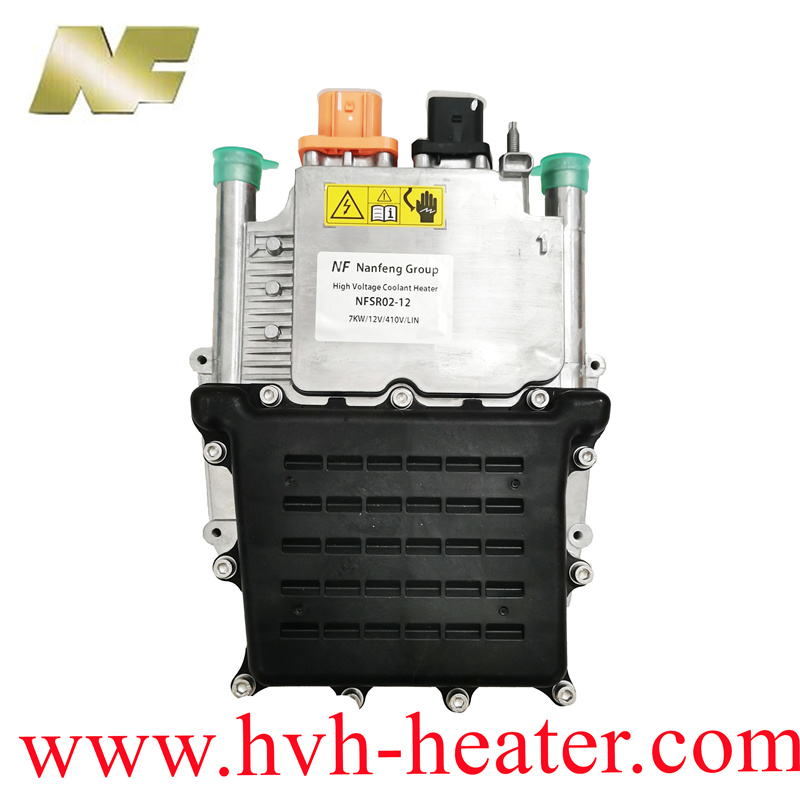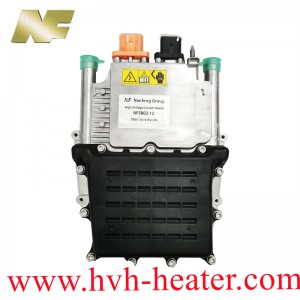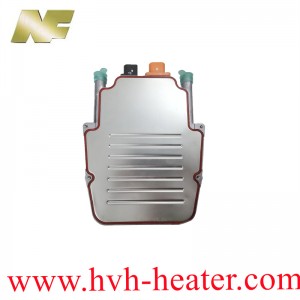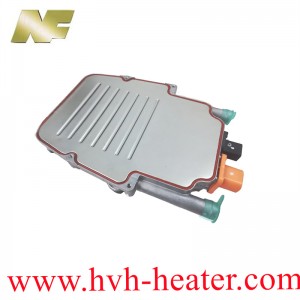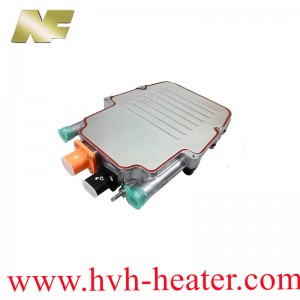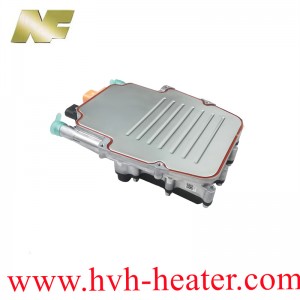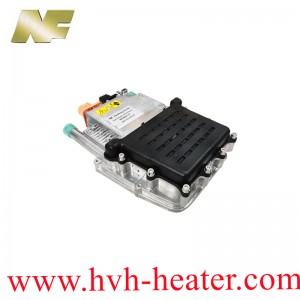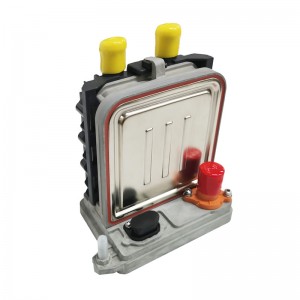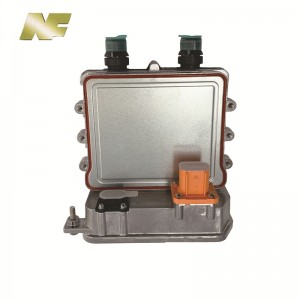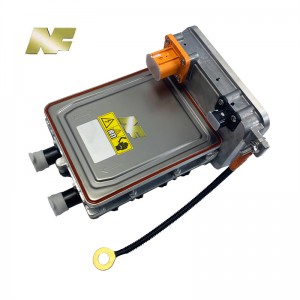NF Best HVCH 7KW High Voltage Coolant Heater 410V DC12V EV Coolant Heater With LIN
Description
As electric vehicles (EVs) become more popular, it is important to understand the key components that keep these vehicles running efficiently. Electric vehicle coolant heaters, also known as battery coolant heaters or automotive high-voltage heaters (HVCH), play an important role in maintaining the performance and reliability of electric vehicles.
EV coolant heaters regulate the temperature of the battery pack and high-voltage components of the electric drivetrain. These heaters help ensure the battery is operating within an optimal temperature range, which is critical to maximizing its performance, efficiency and longevity.
Battery performance is directly affected by temperature. Extremely cold temperatures can lead to reduced battery efficiency, range, and overall performance. On the contrary, high temperatures will accelerate the degradation of batteries and shorten their service life. This makes electric vehicle coolant heaters an important component in maintaining battery health in all weather conditions.
In cold climates, electric vehicle coolant heaters play a vital role in pre-conditioning the battery before driving. Coolant heaters help mitigate the effects of cold weather on battery performance by heating the battery to optimal operating temperature. This not only improves driving range but also enhances the overall driving experience for EV owners.
In addition, electric vehicle coolant heaters prevent the battery from overheating in high temperature conditions. By actively cooling the battery pack when necessary, these heaters help protect the battery cells from overheating, thereby extending the overall battery life.
In addition to the battery pack, EV coolant heaters regulate the temperature of high-voltage components in the electric powertrain. These components, including motors, inverters and other electrical systems, must be kept within specific temperature ranges to ensure optimal efficiency and performance. Coolant heaters play a vital role in achieving this goal by actively managing the temperature of these high-voltage components.
It's worth noting that the design and efficiency of EV coolant heaters may vary between EV models. Some vehicles may use a dedicated electric heater, while others may have a coolant heater incorporated into the vehicle's overall thermal management system. Regardless of the specific implementation, the main function remains the same - maintaining the temperature of critical components within the electric vehicle to ensure optimal performance and longevity.
As demand for electric vehicles continues to grow, so does EV coolant heater technology. Manufacturers continue to develop more efficient and reliable coolant heaters to meet the changing needs of electric vehicles. These advancements may include improved heating/cooling capabilities, energy efficiency, and integration with the overall vehicle thermal management system.
In conclusion, the electric vehicle coolant heater is a key component of electric vehicles and plays a vital role in maintaining the temperature of the battery pack and high-voltage components. By ensuring these critical components are operating within optimal temperature ranges, coolant heaters help improve the overall performance, efficiency and longevity of electric vehicles. As the automotive industry continues to embrace vehicle electrification, the importance of EV coolant heaters in supporting the reliability and functionality of electric vehicles cannot be overstated.
Technical Parameter
| Electric power | ≥7000W, Tmed=60℃; 10L/min, 410VDC |
| High voltage range | 250~490V |
| Low voltage range | 9~16V |
| Inrush current | ≤40A |
| Control mode | LIN2.1 |
| Protection level | IP67&IP6K9K |
| Working temperature | Tf-40℃~125℃ |
| Coolant temperature | -40~90℃ |
| Coolant | 50 (water) + 50 (ethylene glycol) |
| Weight | 2.55kg |
Product Size
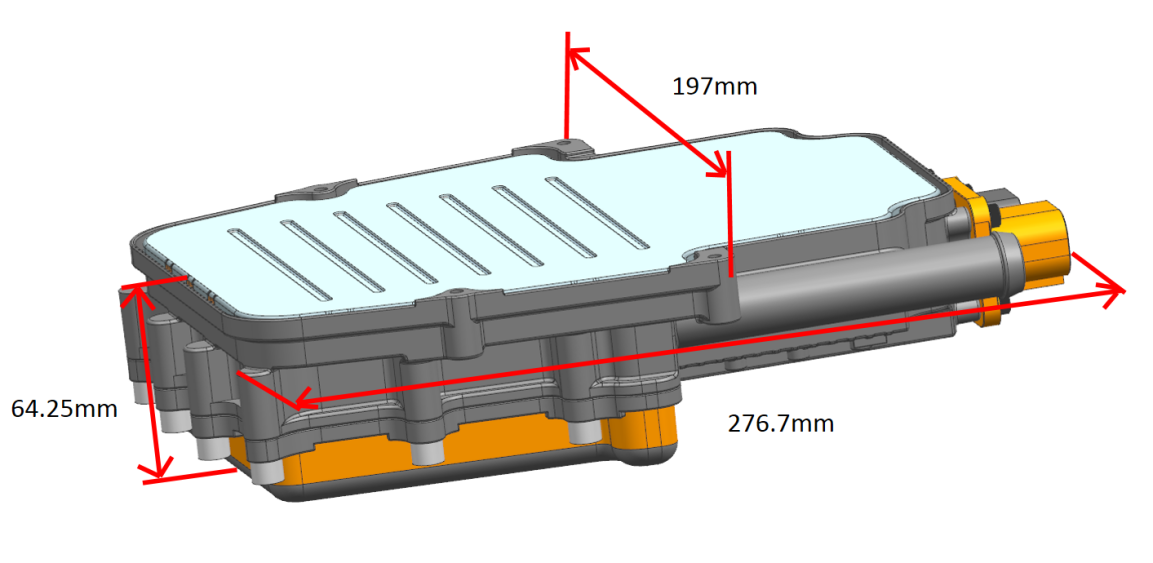
Installation example
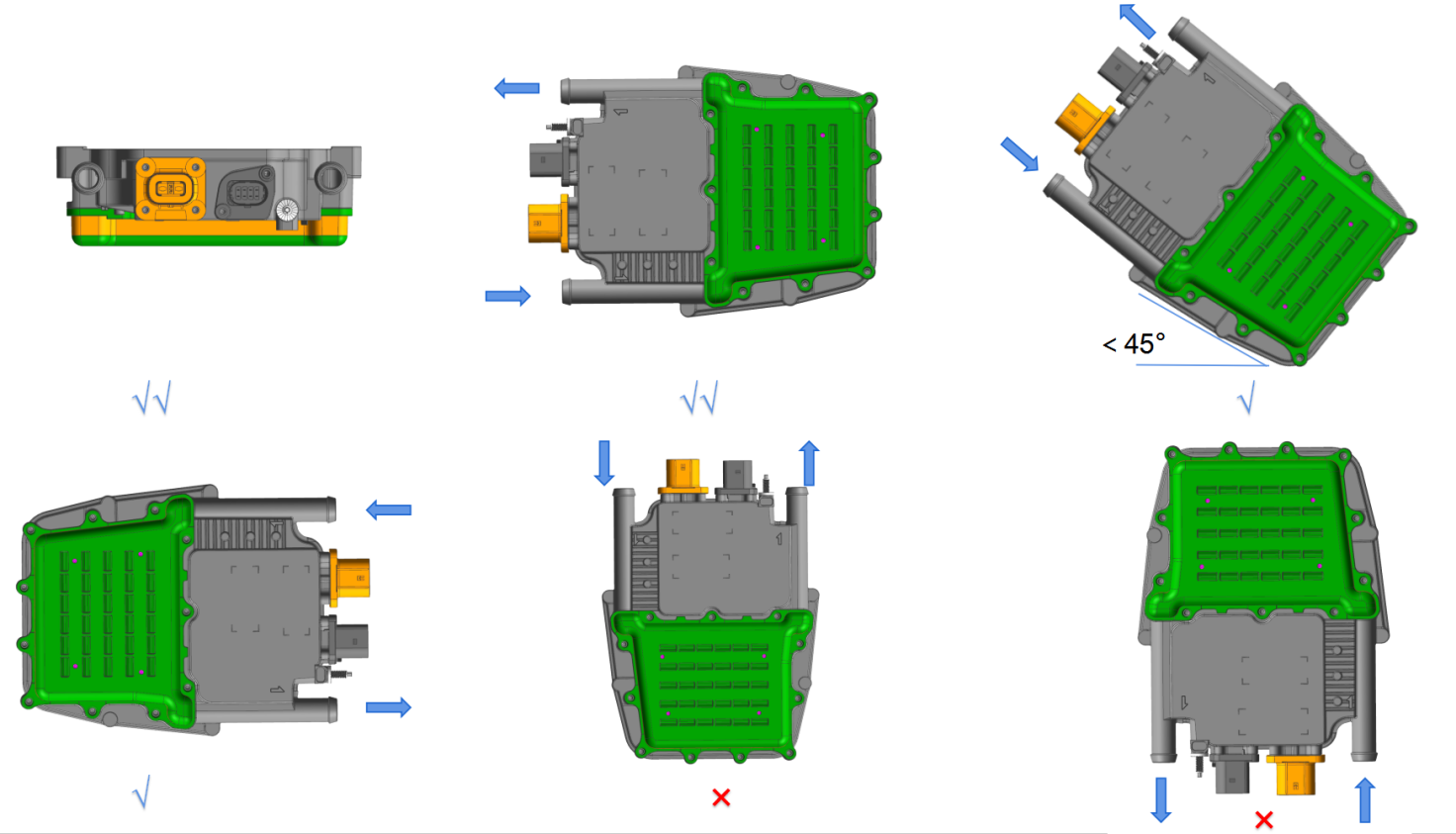
Vehicle installation environment requirements
A. The heater must be arranged according to recommended requirements, and it must be ensured that the air inside the heater can be discharged with the waterway. If air is trapped inside the heater, it may cause the heater to overheat, thereby activating software protection, which may cause hardware damage in serious cases.
B. The heater is not allowed to be placed at the highest position of the cooling system. It is recommended to place it at a relatively lower position of the cooling system.
C. The working environment temperature of the heater is -40℃~120℃. It is not recommended to install it in an environment without air circulation around high heat sources of the vehicle (hybrid vehicle engines, range extenders, pure electric vehicle heat exhaust pipes, etc.).
D. The permitted layout of the product in the vehicle is as shown in the figure above:
Advantage
A. Overvoltage protection: The entire vehicle needs to have an overvoltage and undervoltage power supply shutdown function
B. Short-circuit current: It is recommended that special fuses be arranged in the high-voltage circuit of the heater to protect the heater and high-voltage circuit related parts.
C. The entire vehicle system needs to ensure a reliable insulation monitoring system and insulation fault handling mechanism.
D. High-voltage wire harness interlock function
E. Ensure that the positive and negative poles of the high-voltage power supply cannot be connected reversely
F: Heater design life is 8,000 hours
CE certificate
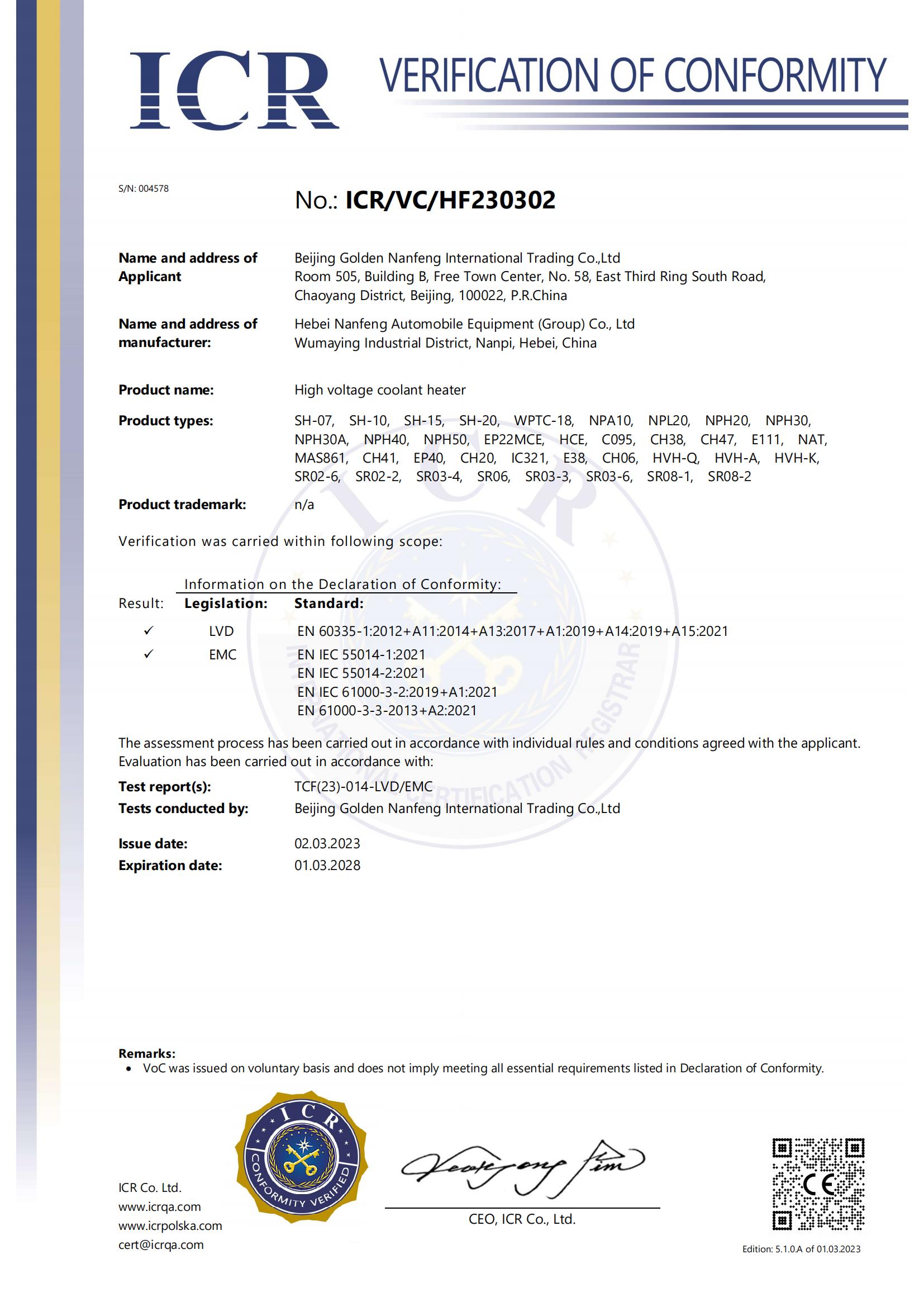
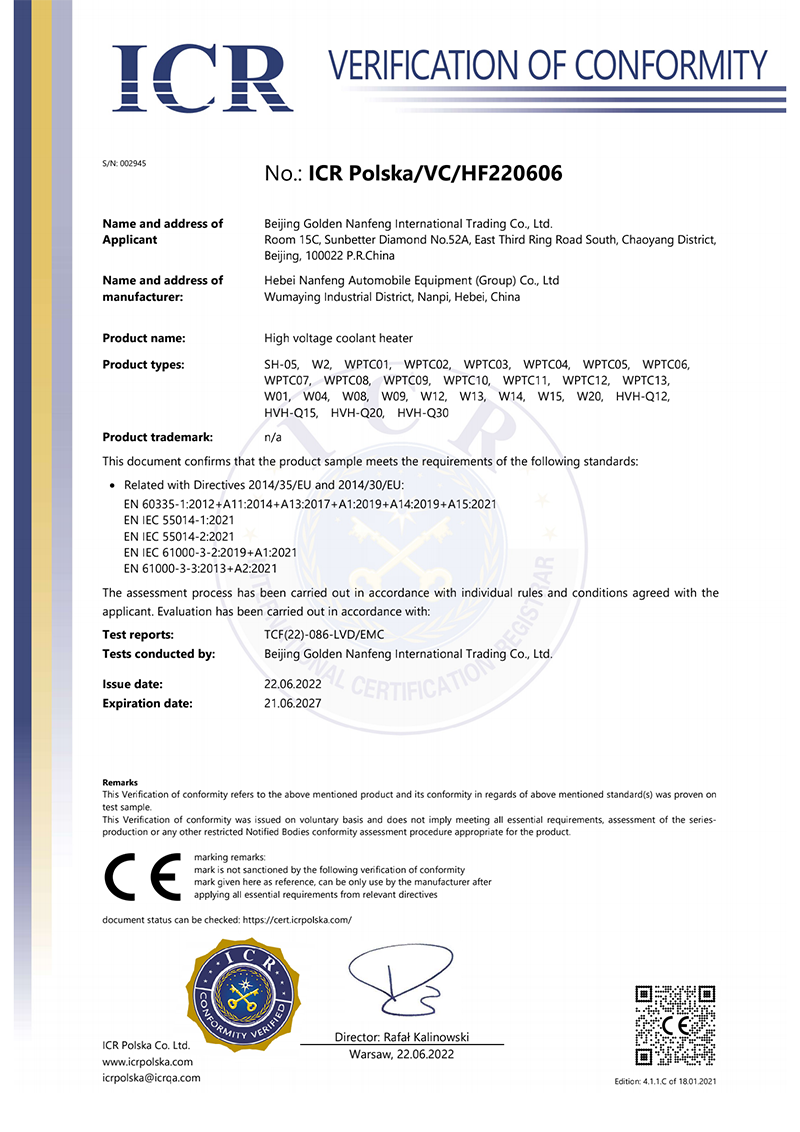
Company Profile


Hebei Nanfeng Automobile Equipment (Group) Co.,Ltd is a group company with 6 factories, that specially produce parking heaters, parking air conditioners, electric vehicle heaters and heater parts for more than 30 years. We are the leading parking heater manufacturers in China.
Our factory's production units are equipped with high tech machineries, strict quality control testing devices and a team of professional technicians and engineers endorsing the quality and authenticity of our products.
Meeting the standards and demands of our customers have always been our top priority. It always encourages our experts to continuously brain storm, innovate, design and manufacture new products, impeccably suitable for the Chinese market and our customers from every nook of the world.
FAQ
1. What is an electric vehicle coolant heater?
An electric vehicle coolant heater is a component of an electric vehicle's thermal management system that helps heat the coolant in the vehicle's battery pack, motor, and other components. This helps optimize the performance and efficiency of electric vehicles, especially in cold weather conditions.
2. How does an electric vehicle coolant heater work?
Electric vehicle coolant heaters work by using power from the vehicle's battery pack to heat the coolant, which is then circulated through the various components of the electric vehicle's thermal management system. This helps maintain optimal operating temperatures for EV systems, improving their overall efficiency and performance.
3. Why are coolant heaters important for electric vehicles?
Coolant heaters are important for electric vehicles because they help ensure that the vehicle's battery pack and other components are operating at optimal temperatures. This helps extend the life of the battery pack and improves the overall performance and efficiency of electric vehicles, especially in cold weather conditions.
4. What are the benefits of using a battery coolant heater?
Using a battery coolant heater can provide a variety of benefits to electric vehicles, including improved battery performance and lifespan, improved overall vehicle efficiency, and increased driving range, especially in cold climates.
5. How does a battery coolant heater differ from an electric vehicle coolant heater?
While battery coolant heaters and EV coolant heaters serve the same purpose of heating the coolant in an electric vehicle, a battery coolant heater is specifically focused on heating the coolant in a vehicle's battery pack, while EV coolant The heater can also heat the coolant in electric vehicles. Other components in electric vehicle thermal management systems.
6. Can existing electric vehicles be retrofitted with battery coolant heaters?
Yes, in many cases a battery coolant heater can be retrofitted into an existing electric vehicle. This can be done through aftermarket installation or with the help of a qualified EV technician.
7. Are there different types of electric vehicle coolant heaters?
Yes, there are different types of coolant heaters available for electric vehicles, including resistance heaters, heat pump systems, and liquid-cooled thermal management systems. The type of coolant heater used may vary depending on the specific electric vehicle model and manufacturer.
8. How to maintain the coolant heater of an electric vehicle?
To maintain the coolant heater in your electric vehicle, be sure to follow the manufacturer's recommended maintenance schedule and have the coolant heater inspected regularly by a qualified electric vehicle technician. This helps ensure that the coolant heater continues to operate efficiently.
9. Can a battery coolant heater help in extreme weather conditions?
Yes, a battery coolant heater can help in extreme weather conditions, ensuring that your vehicle's battery pack remains at optimal operating temperature, even in extremely cold or hot temperatures. This helps improve the overall performance and efficiency of electric vehicles.
10. Will using a coolant heater affect the cruising range of an electric vehicle?
Using a coolant heater may have a small impact on an electric vehicle's range, as it does require some energy from the vehicle's battery pack. However, the overall benefits of using a coolant heater (such as improved performance and efficiency) usually outweigh any minimal reduction in mileage.

